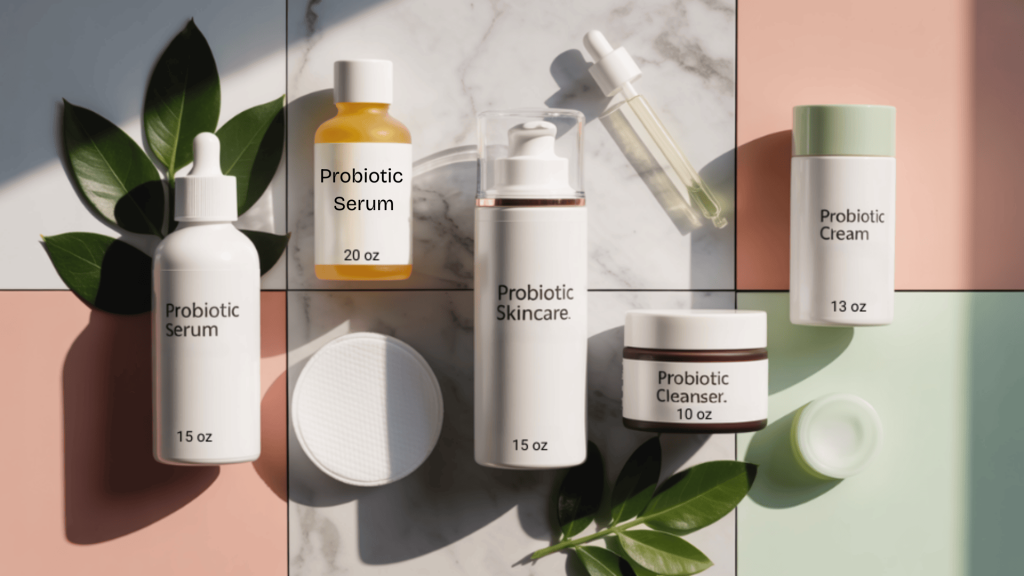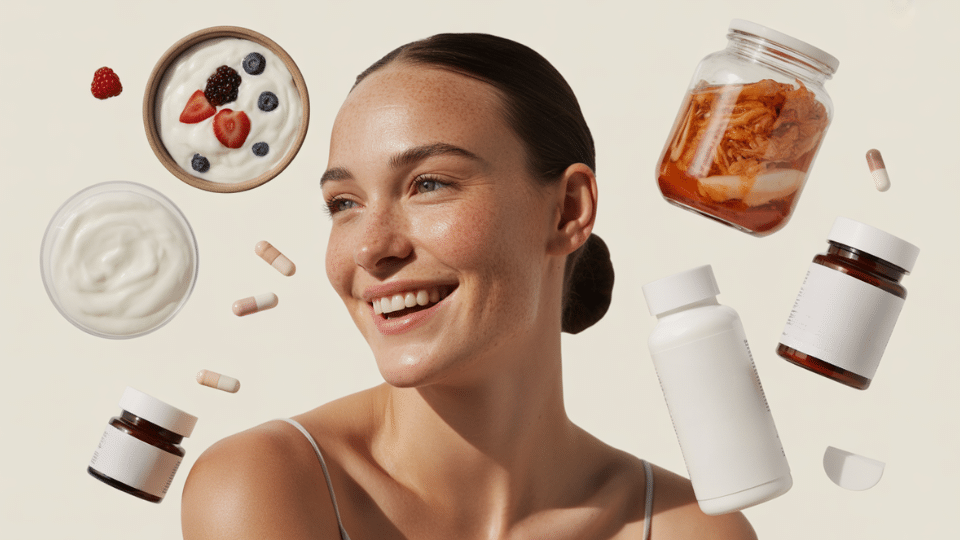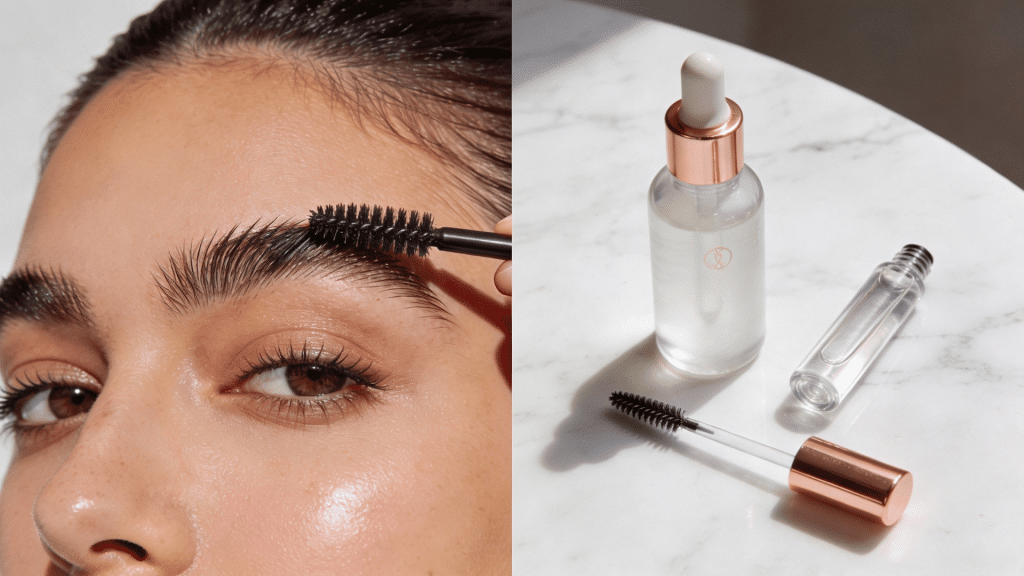Your skin hosts millions of tiny bacteria that help keep it healthy and radiant. Just as your gut relies on good bacteria to operate well, your skin benefits from these beneficial microorganisms known as probiotics.
Scientists study probiotics for skin to combat acne, dryness, and irritation. Topical probiotics balance skin bacteria and protect against germs.
Probiotic skincare products are gaining popularity because they provide a gentle, natural way to support your skin’s health. Understanding this science can help you make better choices for your skincare routine.
Let’s find out how these tiny helpers can alter your skin from the inside out.
The Skin Microbiome Foundation
Your skin hosts trillions of beneficial microorganisms, collectively known as the skin microbiome. This invisible community of bacteria and fungi acts as your body’s first defense against harmful pathogens.
These friendly microbes regulate pH levels, produce antimicrobial compounds, and maintain your skin’s natural barrier. When disrupted by harsh products, stress, or environmental factors, you may experience acne, eczema, or sensitivity.
Understanding this microbiome foundation is key to maintaining healthy skin function and preventing common skin issues through proper care.
Why probiotics for skin can be so effective; they work to restore and maintain this crucial microbial balance.
The Science Behind Probiotic Skincare
Research shows topical probiotics can help skin issues. Scientists tested a cream with beneficial bacteria on eczema patients in a rigorous study, showing clear improvements.
1. Acne Treatment and Prevention
While mainly focused on eczema, research also suggests that probiotics can help with acne.
- Fight acne bacteria: People with acne who used topical probiotics had fewer breakouts and less redness
- Strengthen skin barrier: Good bacteria help the skin make protective oils and proteins
- Less inflammation: Probiotics calm down angry, red skin around pimples
2. Eczema and Atopic Dermatitis
The study clearly demonstrated several beneficial effects for eczema, highlighting promising results.
- Better eczema symptoms: People’s eczema got much better with the probiotic cream
- Less itching: Patients had much less itching compared to those using regular cream
- Better sleep: People slept better because their skin wasn’t keeping them awake
3. Anti-Aging and Photoprotection
Research indicates that incorporating probiotics might be beneficial for maintaining healthier, youthful skin as we age.
- Protect skin cells: Probiotics help repair damage from sun exposure
- Make skin stronger: They help the skin make more collagen, which keeps skin firm
- Reduce inflammation: Probiotics calm down skin irritation and redness
4. Skin Barrier Function
Research indicates that probiotics help strengthen the skin’s barrier, making it more resilient and healthier.
- Stop water loss: A Better skin barrier means less dryness
- Speed healing: Studies show probiotics help skin cells renew faster
- Protect from germs: A strong skin barrier keeps harmful bacteria out
The Gut-Skin Connection
The connection between probiotics for skin health comes from basic body processes that scientists are now starting to understand.
Your gut and skin talk to each other through something called the gut-skin axis. This is like a communication system that controls inflammation, immune responses, and how well your skin works.
When the good bacteria in your gut get out of balance, it causes inflammation throughout your body. This inflammation shows up as different skin problems like acne or eczema.
The good bacteria in your gut make special substances that help your skin barrier work better and heal faster.
Studies show that taking the right probiotics can fix your gut balance and improve your skin health from the inside out, treating the real cause instead of just the symptoms you see.
The Inside-Out Approach to Skincare

Oral probiotics offer a revolutionary skincare approach by targeting root causes instead of surface symptoms. With billions of beneficial bacteria, they colonize the digestive tract and promote clearer, healthier skin.
Restoring gut microbiome balance triggers internal improvements that naturally enhance your complexion.
Key Benefits of Oral Probiotics for Skin Health:
- Work from the inside out by targeting the gut-skin connection through the colonization of beneficial bacteria in your digestive system.
- Reduce systemic inflammation by decreasing inflammatory markers in the bloodstream that directly impact skin cells.
- Enhance nutrient absorption to ensure your skin receives the essential vitamins and minerals necessary for repair and regeneration.
- Support immune function, which is crucial for maintaining healthy skin and preventing various skin conditions.
- Show results in 8-12 weeks of consistent use, making this approach ideal for maintaining long-term skin health.
- Particularly beneficial for people with acne, eczema, and rosacea who often have disrupted gut bacteria.
Topical Probiotics for Skin

Topical probiotics deliver beneficial microorganisms directly to the skin, creating a protective environment that supports natural defenses.
Unlike oral supplements, they offer targeted treatment for specific skin concerns, providing faster visible results.
Key Benefits of Topical Probiotics for Skin Health:
- Apply beneficial microorganisms directly to your skin’s surface for targeted treatment where it’s needed most.
- Available in various forms, including serums, moisturizers, and cleansers with live bacteria or probiotic-derived ingredients.
- Colonize skin temporarily, competing with harmful bacteria for space and resources on the skin surface.
- Produce protective compounds that strengthen your skin barrier and reduce inflammation at the site of application.
- Deliver faster results with many users reporting improvements in skin texture within 4-6 weeks.
- Offer targeted delivery advantage over oral supplements by working directly where skin issues occur.
Limitations and Considerations
While probiotics show great promise for skin health, understanding their limitations helps set realistic expectations and guides informed decision-making for your skincare routine.
| ASPECT | LIMITATION/CONSIDERATION | WHAT THIS MEANS |
|---|---|---|
| Product Quality | Inconsistent bacterial counts | Many products don’t contain the advertised live bacteria by the expiration date |
| Individual Response | Results vary significantly | What works for one person may not work for another due to unique microbiomes |
| Storage Requirements | Temperature-sensitive | Improper storage can kill beneficial microbes before use |
| Initial Side Effects | Potential breakouts or digestive issues | Some people experience temporary worsening before improvement |
| Time Frame | Slow results | Benefits typically take 4-12 weeks to become noticeable |
| Cost Factor | Higher price point | Quality probiotic skincare products can be expensive |
| Not a Complete Solution | Requires a comprehensive approach | Works best alongside proven skincare practices, not as a replacement |
| Professional Guidance | Individual assessment needed | Dermatologist consultation recommended for specific skin concerns |
Being aware of these considerations allows you to make educated choices about incorporating probiotic skincare while maintaining realistic expectations for results.
How to Add Probiotics to Your Skincare Routine?
Successfully integrating ti into your skincare regimen demands careful planning and patience. Follow these evidence-based strategies to achieve optimal results while avoiding common mistakes.
- Introduce one probiotic product at a time to identify what works best for your skin type
- Begin with 1-5 billion CFUs for sensitive skin, 5-10 billion for normal skin, always with meals to prevent digestive upset
- Apply probiotic serums to damp, freshly cleansed skin, wait 5-10 minutes before adding moisturizer to ensure maximum penetration
- Test new topical probiotics on your inner wrist for 24-48 hours, then behind your ear for another 24 hours before facial application
- Take oral probiotics with your largest meal of the day (usually dinner) for better survival through stomach acid
- Refrigerate live probiotic products, keep topicals in cool, dark places, and check expiration dates regularly
- Continue using proven staples like gentle pH-balanced cleansers, broad-spectrum SPF 30+, and ceramide-rich moisturizers
- Take weekly photos, note skin texture changes, and keep a symptom diary to identify patterns and improvements
- Expect potential initial breakouts or minor irritation for 2-6 weeks as your skin microbiome rebalances
Remember, consistency wins over perfection when building a routine. Start small, stay patient, and let your skin guide you toward the healthiest version of itself.
The Future of Your Skin Starts Today
Probiotics for skin represent a game-changing approach to skincare that works from the inside out.
Whether you choose oral supplements or topical probiotics for skin products, you’re supporting your body’s natural healing processes.
Probiotic skincare helps restore balance to both your gut and skin microbiomes, leading to clearer, healthier skin. Scientific research shows real promise for treating common skin problems, such as acne, eczema, and sensitivity.
Feeding your body good bacteria targets root causes, not just symptoms. Starting a probiotic routine might unlock your best skin naturally and scientifically.







